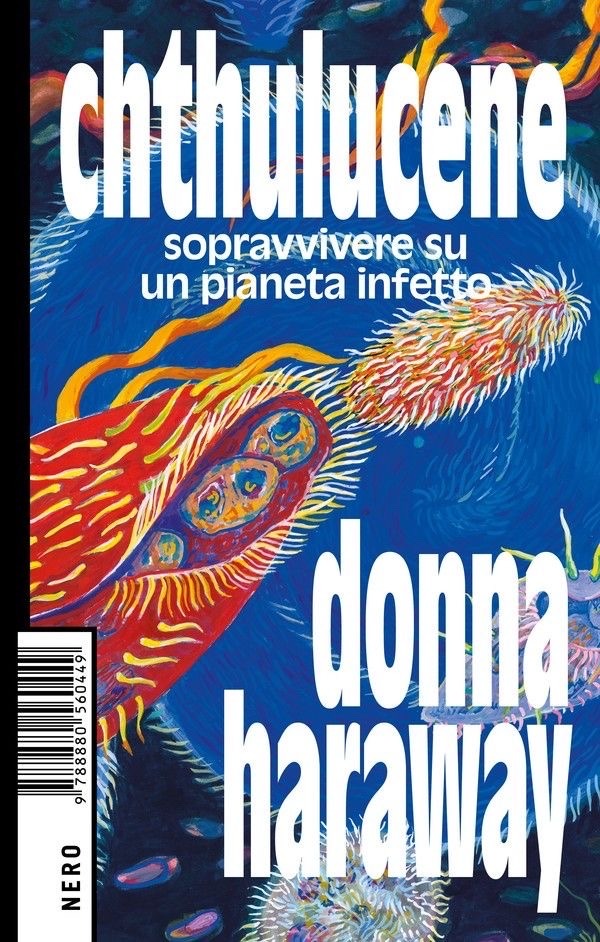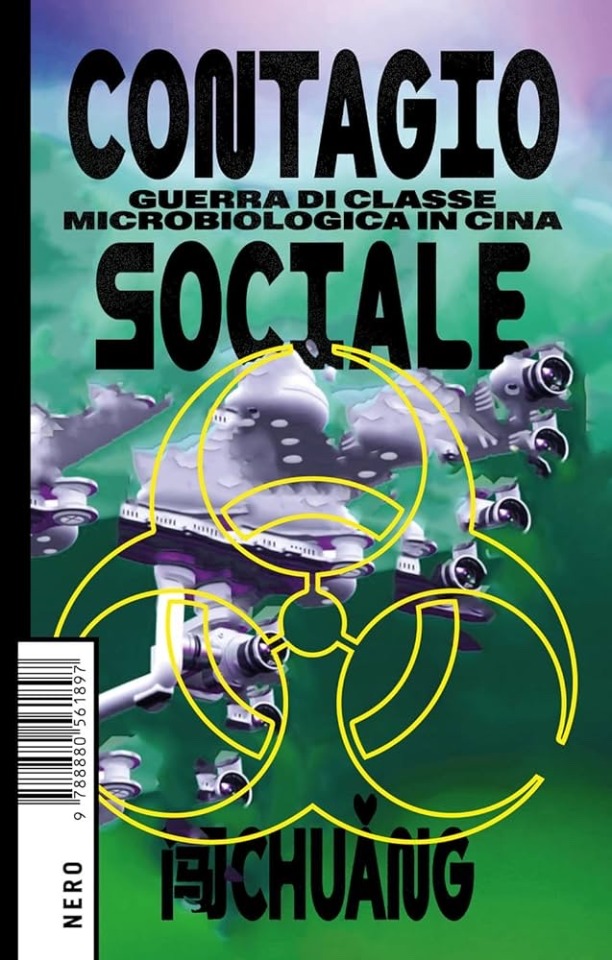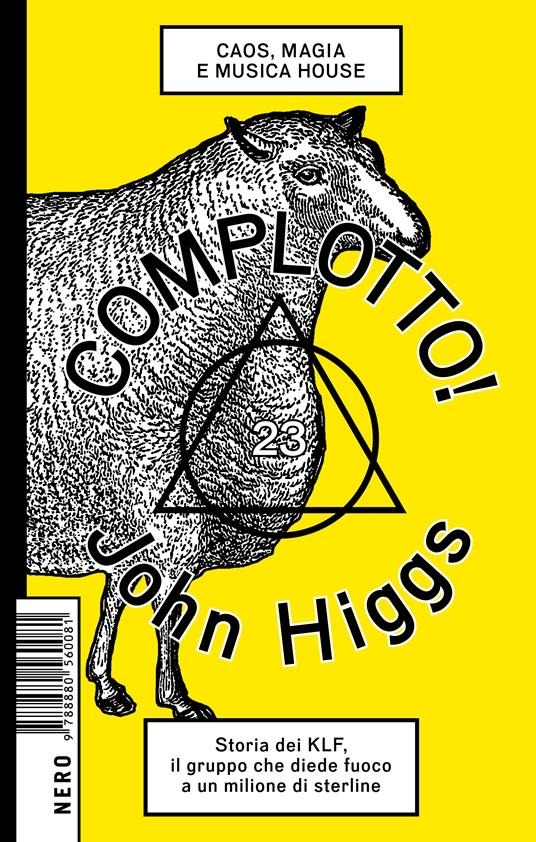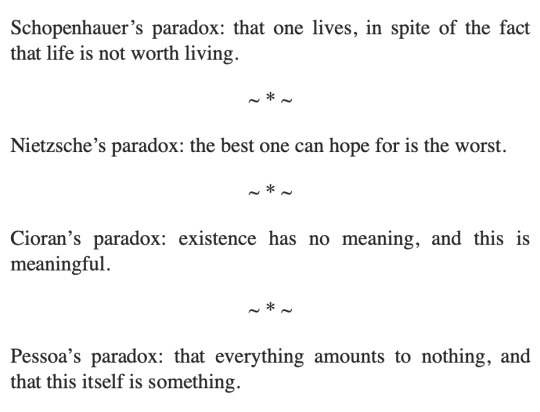#eugene thacker
Explore tagged Tumblr posts
Text

Eugene Thacker, "Nine Disputations on Theology and Horror", Collapse: Philosophical Research and Development, Vol. IV
10K notes
·
View notes
Text
"A new ignorance is on the horizon, an ignorance borne not of a lack of knowledge but of too much knowledge, too much data, too many theories, too little time."
Tentacles Longer Than the Night - Eugene Thacker
97 notes
·
View notes
Text
“Traditionally, the Socratic tradition in philosophy has a therapeutic function, which is to dispel the horrors of the unknown through reasoned argument. What cannot be tolerated in this tradition is the possibility of a world that cannot be known, or a world that is indifferent to our elaborate knowledge-producing schemes.” ― Eugene Thacker, Starry Speculative Corpse: Horror of Philosophy
4 notes
·
View notes
Text








#not#nero edizioni#books#cool#donna haraway#Helen Hester#eugene thacker#Kodwo Eshun#sayak Valencia#闯 Chuang#yuk hui#john higgs#favorite books
34 notes
·
View notes
Text
We have to entertain the possibility that there is no reason for something existing; or that the split between subject and object is only our name for something equally accidental we call knowledge; or, an even more difficult thought, that while there may be some order to the self and the cosmos, to the microcosm and macrocosm, it is an order that is absolutely indifferent to our existence, and of which we can have only a negative awareness.
In the Dust of This Planet
Eugene Thacker
42 notes
·
View notes
Text


From After Life, by Eugene Thacker
33 notes
·
View notes
Text
Not to get too much of a sociologist on main, but grading papers that involves Durkheim's theory of social facts reminds me of when Eugene Thacker read works of philosophy as horror, and you could probably do the same with social facts.
We teach that "Social facts are things", Durkheim says they exist beyond people and control society and are things like language, religion, basically things sociology studies. And that they are external to us, and we cannot directly change them while they continue to act on us. Is this not a cosmic horror idea, of a high concept being that governs humans social life that we can't escape from?
8 notes
·
View notes
Text
I think about stuff Eugene Thacker said and believe I can sense an affinity with hongaku thought, in not too dissimilar ways to how I receive Gruppo Di Nun. It kind of comes back to what Thacker said about how, in his view, what is revealed in occultism is hiddenness itself.
Another hongaku-like musing: I caught up with Sacred Verses, read a poem in it about hearing the gods in the sounds of birds and sycamore trees, and for a while I thought, if you could hear them in the flowing of blood and other terrible things, you will sense them everywhere.
I'm not lying when I tell people that hongaku is probably one of the biggest parts of my own particular philosophical worldview. I love thinking about hongaku, and I love thinking about it as way to truly love life, because you can love it at is ultimate, obscure, darksome level.
#hongaku#esoteric buddhism#japanese buddhism#darkness#paganism#occultism#left hand path#eugene thacker
4 notes
·
View notes
Text
EUGENE THACKER In the Dust of This Planet - The Horror of Philosophy Vol. 1
In short, when the non-human world manifests itself to us in these ambivalent ways, more often than not our response is to recuperate that non-human world into whatever the dominant, human-centric worldview is at the time.
3 notes
·
View notes
Text

Eugene Thacker, Infinite Resignation
#eugene thacker#infinite resignation#arthur schopenhauer#friedrich nietzsche#emil cioran#fernando pessoa#philosophy#p
2K notes
·
View notes
Text
The Abyss Gazes Back: Pessimism as a Lens on Existential Collapse
Introduction: The Void as Horizon Imagine standing at the precipice of existence, toes curled over stone, not to marvel at grandeur but to confront the abyss—a vast, unending void that erodes light, dissolves laughter, and extinguishes hope. The air hangs heavy with a faint metallic tang—like distant storm clouds gathering—or the subtle, primal scent of fear lingering faintly, an unwelcome shadow…

View On WordPress
#6th Mass Extinction#Age of Climate Chaos#Anti-Natalism#Arthur Schopenhauer#Consumerism#Cosmic Pessimism#Emil Cioran#Eugene Thacker#John Gray#Meaning of Life#Nihilism#Peter Wessel Zapffe#The Anthropocene Age#Thomas Ligotti#Will-to-Suffer#World-in-Itself
1 note
·
View note
Text
"What if depression – reason’s failure to achieve self-mastery – is not the failure of reason but instead the result of reason? What if human reason works “too well,” and brings us to conclusions that are anathema to the existence of human beings?" (from "Starry Speculative Corpse: Horror of Philosophy" by Eugene Thacker)
3 notes
·
View notes
Text
27 de agosto de 2023
"There is no better display of existential squalor than human beings performing their own enjoyment before each other."
--Eugene Thacker. Infinite Resignation.
0 notes
Text

How a Book on Nihilism Ended Up on Jay-Z’s Back
1 note
·
View note
Text

1 note
·
View note
